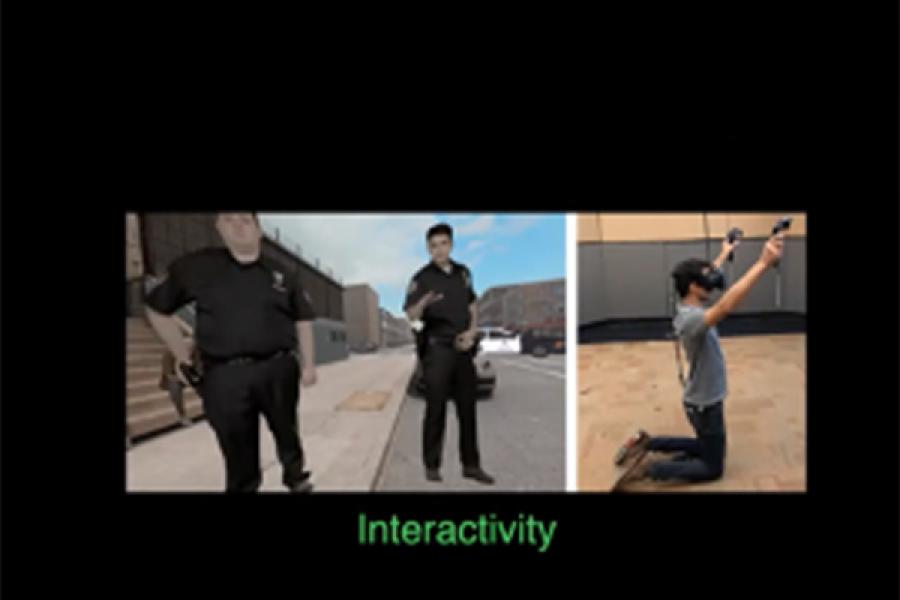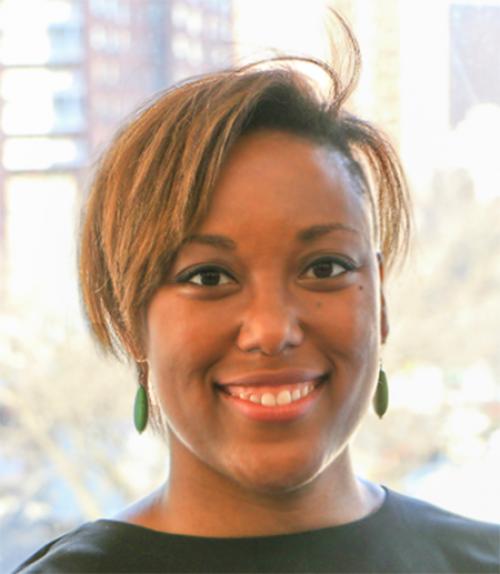Courtney Cogburn, associate professor of social work at Columbia University and director of “1000 Cut Journey,” shared her story about creating the virtual-reality experience during a November webinar with students in the Milstein Program in Technology & Humanity.
“1000 Cut Journey” takes participants through three moments in the life of a Black man named Michael Sterling. Through the journey, users experience racist incidents as a toddler, teenager and young adult.
The experience, Cogburn said, examines patterns and psychosocial effects of cultural racism. The talk, hosted by William Leon, a Cornell Tech alum and instructor for the Milstein Program’s VR independent study course, focused on how Cogburn created the film to measure how virtual reality experiences could lead to changes in attitudes, social perception and engagement through empathy, examining racial bias and behavior.
The VR independent study course helps students learn the skills necessary to make experiences similar to “1000 Cut Journey.”
Their team is a transdisciplinary group of professionals including sociologists, creative technologists, psychologists and designers. In order to understand a problem as complex and deeply woven into the fabric of society as racism, Cogburn said it’s vital to look at it through various disciplinary perspectives.
Through the immersive virtual reality experience, Cogburn and her team try to combat the idea that racism is not only an individual issue, but rather a deep-seeded societal issue that requires direct and non-performative anti-racist action to challenge it.
Although the name “Michael Sterling” was chosen at random for the main character, a reporter pointed out to Cogburn that the two names are a combination of the names Michael Brown and Alton Sterling, two unarmed Black men shot and killed by white police officers.
“These men were part of my subconscious and helped shape my decision making.” Cogburn said. “It was so striking to me that I was so subconsciously attached to these two strangers, acknowledging the ways in which these subscripts shape the way we think about race and racism.”
Throughout the experience, users look at themselves in the mirror as Michael Sterling. By looking at the world through his eyes, users not only experience overt racist incidents such as being racially profiled by police officers, but also the covert racism of being ignored by job interviewers who don’t expect their exceptional candidate to be a Black man.
The project made its public debut at the 2018 Tribeca Film Festival and the VR experience has also been included in the syllabi of several courses across the country, including at UCLA and the University of Michigan.
Following the presentation, a Q&A session was moderated by co-hosts Aviva Munoz ‘23 and Anderson Rogers ‘23, two Milstein Program students enrolled in Leon’s course. Rogers, along with other Milstein students, had the opportunity to experience “The 1000 Cut Journey” using a headset, set up for them in a dedicated space provided to them by the Milstein Program.
“As someone who is beginning to work with VR, it was fascinating to see how this project combines different types of media to tell a compelling narrative,” said Andres Murillo ’24.”Despite the limitations that VR currently has, Dr. Cogburn embraces these restrictions and uses them to add yet another layer of storytelling to the ‘1,000 Cut Journey.’ ”
When asked about the future of the project, Cogburn said she hopes that virtual reality technology could be widely available in free, community spaces such as museums and libraries.
Launched in 2017, the Milstein Program offers a unique multidisciplinary curriculum to students in the College of Arts & Sciences, with workshops in design thinking, community engagement and technology topics, and two summers spent at Cornell Tech in New York City.
Aidan Kelly is the program assistant for the Milstein Program in Technology & Humanity.





